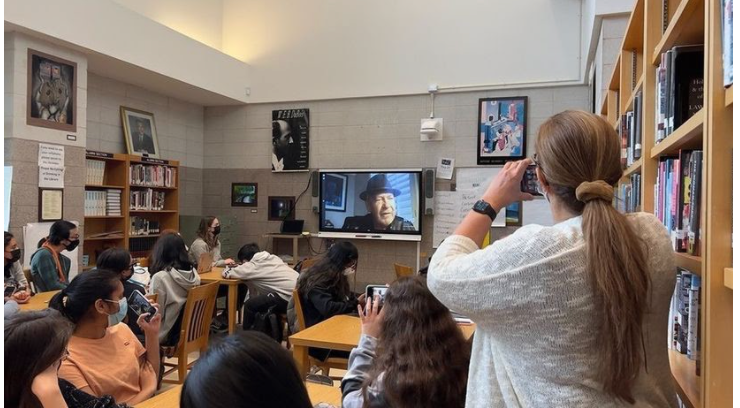
On January 19, the first of several LGBTQ+ author talks hosted by the NYC Department of Education (DOE) started off with poet and novelist Benjamin Alire Sáenz, author of Aristotle and Dante Discover the Secrets of the Universe. Last year, Sáenz gave his most popular book a sequel, Aristotle and Dante Dive into the Waters of the World, which he explored in this talk streamed in the Townsend Harris High School Library.
Arlene Laverde, the THHS Librarian, who was present for the event, said, “The library is so excited and thrilled to be able to offer this series.”
Sáenz’s Aristotle and Dante series tells the story of two Mexican-American boys falling in love in the larger context of their ethnic and social identities. One of its strongest, most memorable elements hits the hearts of many young LGBTQ+ readers: supportive parents who respect the adults their children are becoming.
Sáenz started off the talk with a background of how he came to write the sequel after never intending to publish it. Upon re-examining the original novel, he came to feel unsatisfied with the story’s general omission of the historical context of Aristotle (Ari) and Dante’s young adult experience; primarily, this involved the reality of living during the height of the AIDS epidemic, which Sáenz himself lost many friends to. As he discussed this, tearing up at a point, the group of listeners gathered in the library went near silent. That’s his purpose, he said, to “speak for the dead, because there’s no one left to speak for them.”
Sáenz wanted to make this issue more central to his second book, turning away from the more intimate romantic element of the first. He acknowledged that this shift might prove unpopular, but for him as well as many proponents of the sequel, this story is equally if not more important to tell.
Ms. Laverde said, “Listening to Benjamin Sáenz speak about the AIDS crisis really touched my heart. I was a teen in the 80’s and vividly remember how the LGBTQ community was treated. It is such a stain on our history as a country, and I am glad that Sáenz spoke so openly about it.” She too believes strongly in the value of diverse books in schools, both in libraries and in curriculums. With Sáenz as a strong start to this series of author features, the library is looking forward to the upcoming talks throughout the spring semester, Ms. Laverde said.
In approaching the writing process for Aristotle and Dante Dive into the Waters of the World, Sáenz described being intimidated by his own previous work and its wide acclaim. He “couldn’t get into it” at first, ultimately rewriting his draft over the course of the pandemic.
Junior Arianna Caballero, who attended the event, found the interview impactful. They said, “I read Aristotle and Dante Discover the Secrets of the Universe when I was thirteen years old. The book had such a big impact on my life and it was the very first book I read that included a queer relationship.” Now, halfway through the newly published Aristotle and Dante Dive into the Waters of the World, they said, “The sequel is just as good as the first book and is so powerfully moving and inspiring.” In regards to the event, Arianna enjoyed listening along with a friend to Sáenz speaking about the personal connection that he has to his work. They left the event feeling that “I had more knowledge and appreciation towards the author and his books. It’s one of the best feelings in the world.”
Sáenz also delved briefly into how the need to label oneself, such as with gender and sexuality, can be limiting and detrimental. He chooses to not label himself as “queer” because for him that word still contains all of the negative meaning it had in his youth. However, if others are comfortable with that label for themselves, that is also completely acceptable, he said. He went on to say that while one may feel tempted to draw lines to help understand who one is, beyond that, they are nothing but limiting. Particularly, he stated, “Girls and queer men especially dumb ourselves down because we want to fit in… It’s a terrible thing to do.”
Sáenz believes in the power of telling LGBTQ+ stories and sharing them with youth. Writing should be about what’s possible, including queer tragedy and queer joy. In that setting, the stories Sáenz writes are a sort of hopeful realism.
As Sáenz stated, “Young people need books that tell them there is still love in the world.”
Photo by Eunice Lee




























